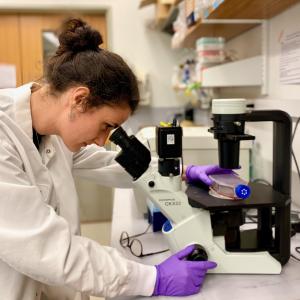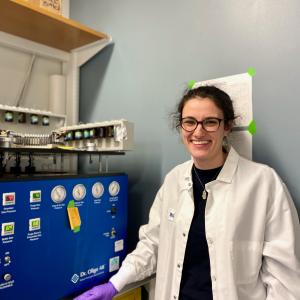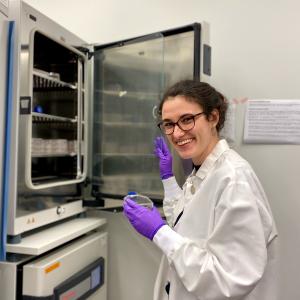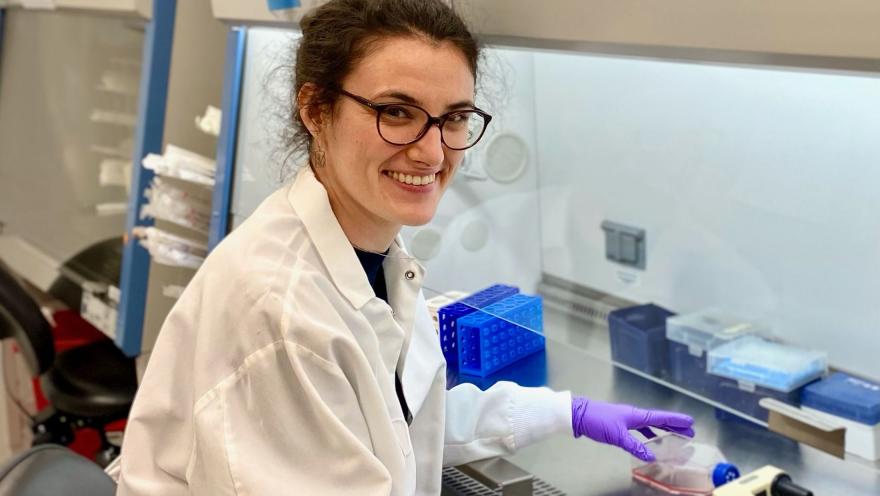February 11th marks the ninth annual International Day of Women and Girls in Science, which serves as an opportunity to recognize the achievements of women working in science, technology, engineering, and mathematics. To celebrate, we are shining a spotlight on one of our 2023 Milton Safenowitz Postdoctoral Fellows and how she is helping move the development of new ALS treatments forward.

Dr. Annie Collins (B.M. B.Ch.) grew up in a very small town in the mountains of western Canada and was fascinated by how the world around her, especially the human body, worked. As she learned about the millions upon millions of tiny biological events that need to happen every day to keep our bodies healthy, pursuing a career in science and medicine seemed like the perfect way to combine that fascination with a desire to make a meaningful impact in the world.
However, while studying medicine at the University of Oxford in the U.K., Annie became frustrated by the disconnect she observed between clinical medicine and laboratory research.
“I want to try and bridge that divide by bringing knowledge of clinical medicine to the lab in an effort to inform the urgent need for the development of new treatment options for diseases such as ALS,” she says.
Now a postdoctoral associate in the labs of Dr. Robert Brown and Dr. Jonathan Watts at UMass Chan Medical School, Annie is doing just that by focusing on a promising new treatment approach for ALS—genetically-targeted therapies.
Broadening the Impact of Genetic Therapies

With the FDA’s approval of tofersen, now known as Qalsody, last spring, genetically-targeted therapies for ALS are garnering a lot of attention. However, up until this point, the use of these therapies has been limited to ALS that runs in families, known as familial ALS, limiting their impact to a small percentage of people living with the disease.
“What we are working to do is develop genetic therapies that target common faulty processes in the cells of the 90% of people with ALS who have the sporadic form of the disease,” explains Annie, who is focused on developing ways to turn off a gene known as SYF2. “We also plan to make a new type of genetically targeted treatment, called an siRNASO, that will allow us to treat two of the faulty genetic processes involved in sporadic ALS at the same time and open the door to new combination treatments.”
Because of the high scientific merit of this project and the potential impact for people living with ALS, Annie was awarded a two-year Milton Safenowitz Postdoctoral Fellowship funded by the Luminescence Foundation, Inc., in 2023. This fellowship program, now in its 20th year, encourages young scientists to enter and, importantly, remain in the ALS field. After completing their fellowships, more than 75% of awardees stay in ALS research, with many going on to establish their own laboratories and mentor more ALS researchers along the way.
Annie believes the early stage work she is completing could “lead to clinical trials of these new treatments as well as lay the groundwork for new types of genetically-targeted treatments in the future.”

Annie is deeply appreciative for the opportunity provided by the Safenowitz Fellowship. She also is “exceedingly grateful to the patients and their families for their willingness to engage with the research community and humbled by their incredible courage in the face of adversity.”
If you would like to receive monthly ALS research updates, SUBSCRIBE to our newsletter, Research Matters.
To continue to follow stories about people living with ALS in the community and learn more about the disease, subscribe to receive our weekly blogs in your inbox HERE or follow us at als.org/blog.


Comments
I am a patient. Thank you
Thank you for research being done
Join the conversation. Please comment below.